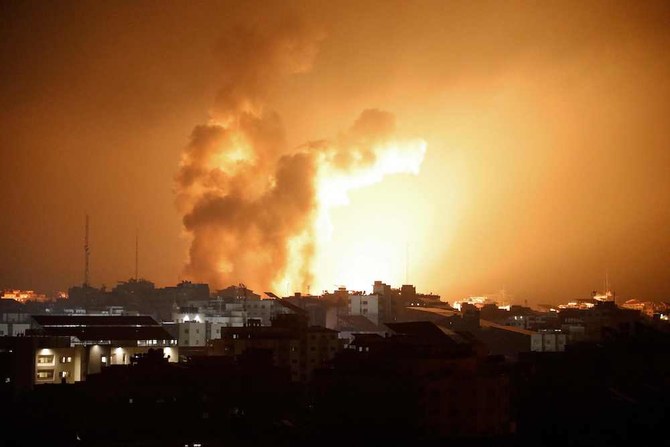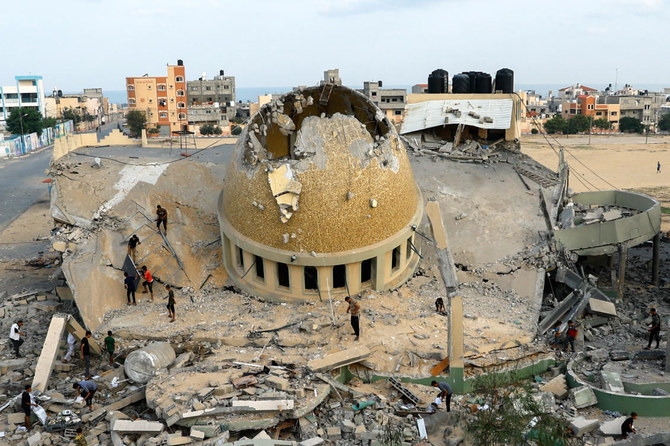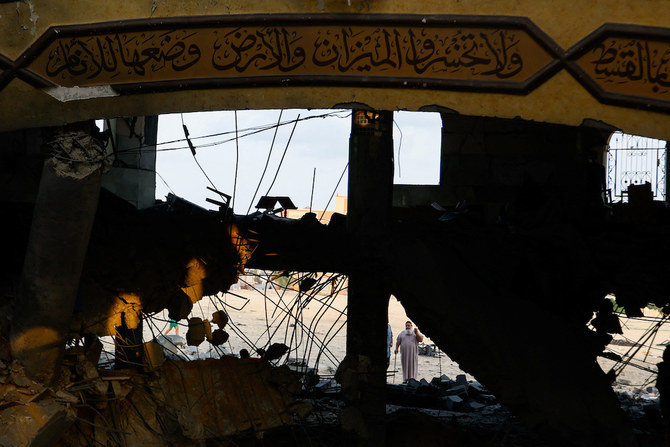JERUSALEM: The Israeli government formally declared war Sunday and gave the green light for “significant military steps” to retaliate against Hamas for its surprise attack, as the military tried to crush fighters still in southern towns and intensified its bombardment of the Gaza Strip. The toll passed 1,100 dead and thousands wounded on both sides.
In an assault of startling breadth, Hamas gunmen rolled into as many as 22 locations outside the Gaza Strip, including towns and other communities as far as 24 kilometers from the Gaza border, while Hamas launched thousands of rockets at Israeli cities.
More than 24 hours after Hamas launched its unprecedented incursion out of Gaza, Israeli forces were still battling with militants holed up in several locations. At least 700 people have reportedly been killed in Israel — a staggering toll on a scale the country has not experienced in decades — and more than 400 have been killed in Gaza.

The declaration of war portended greater fighting ahead, and a major question was whether Israel would launch a ground assault into Gaza, a move that in the past has brought intensified casualties.
Meanwhile, Hamas and the smaller Islamic Jihad group claimed to have taken captive more than 130 people from inside Israel and brought them into Gaza, saying they would be traded for the release of thousands of Palestinians imprisoned by Israel. The announcement, though unconfirmed, was the first sign of the scope of abductions.
The captives are known to include soldiers and civilians, including women, children and elderly — mostly Israelis but also some other nationalities. The Israeli military said only that the number of captives is “significant.”
As many as 1,000 Hamas fighters were involved in Saturday morning’s assault, according to US Secretary of State Antony Blinken, speaking on ABC’s “This Week.” The high figure underscored the extent of planning by the militant group ruling Gaza, which has said it launched the attack in response to mounting Palestinian suffering under Israel’s occupation and blockade of Gaza.
The gunmen rampaged for hours, gunning down civilians and snatching people in towns, along highways and at a techno music festival attended by thousands in the desert near Gaza. The rescue service Zaka said it removed about 260 bodies from the festival, and that number was expected to rise. It was not clear how many bodies were already included in Israel’s toll.
In response, Israel hit more than 800 targets in Gaza so far, its military said, including airstrikes that leveled much of the town of Beit Hanoun in the enclave’s northeast corner.
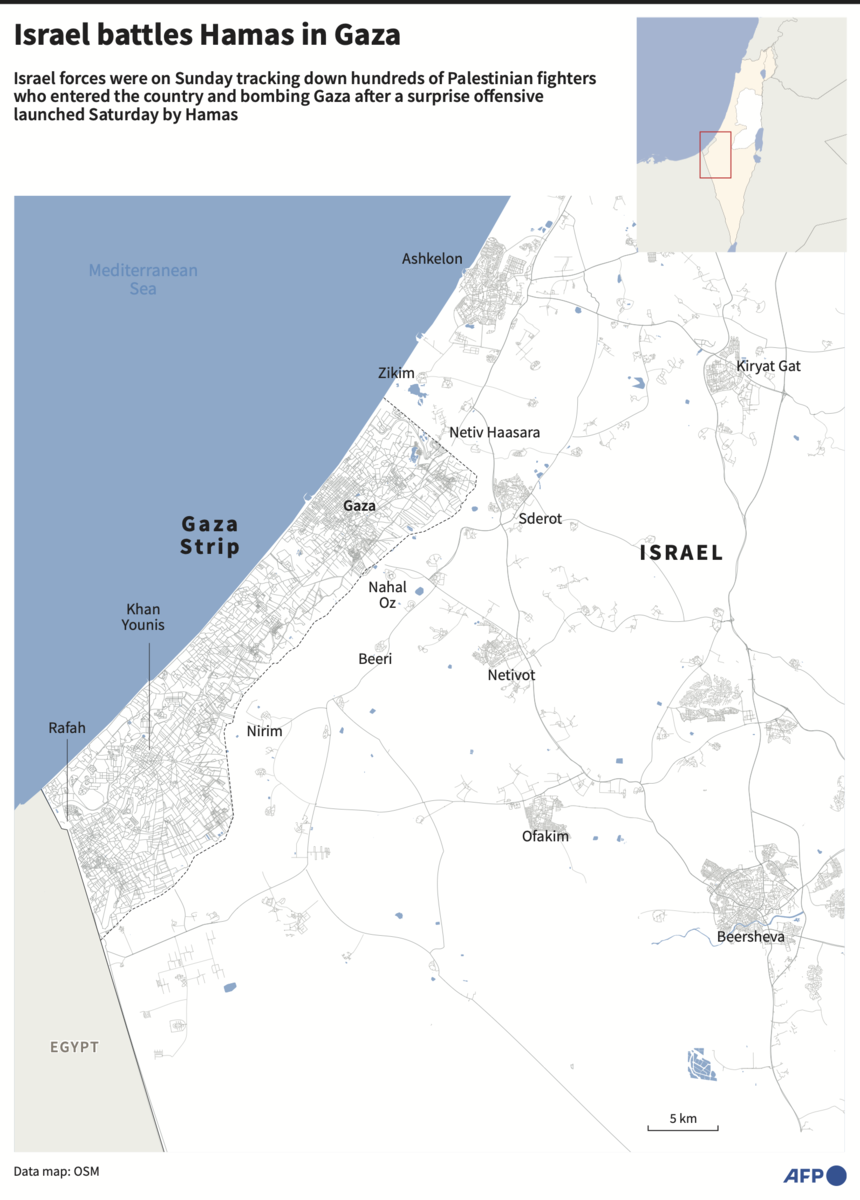
Israeli Rear Adm. Daniel Hagari told reporters Hamas was using the town as a staging ground for attacks. There was no immediate word on casualties, and most of the community’s population of tens of thousands of people likely fled before the bombardment.
“We will continue to attack in this way, with this force, continuously, on all gathering (places) and routes” used by Hamas, Hagari said.
Civilians on both sides were already paying a high price. The Israeli military was evacuating at least five towns close to Gaza.
A line of Israelis snaked outside a central Israel police station to supply DNA samples and other means that could help identify missing family members.
Mayyan Zin, a divorced mother of two, said she learned that her two daughters had been abducted when a relative sent her photos from a Telegram group showing them sitting on mattresses in captivity. She then found online videos of a chilling scene in her ex-husband’s home in the town of Nahal Oz: Gunmen who had broken in speak to him, his leg bleeding, in the living room near the two terrified, weeping daughters, Dafna, 15, and Ella, 8. Another video showed the father being taken across the border into Gaza.
“Just bring my daughters home and to their family. All the people,” Zin said.
In Gaza, the tiny enclave of 2.3 million people sealed off by an Israeli-Egyptian blockade for 16 years since the Hamas takeover, residents feared an intensified onslaught. Israeli strikes flattened some residential buildings.
Nasser Abu Quta said 19 members of his family including his wife were killed when an airstrike hit their home, where they were huddling on the ground floor in the southern Gaza city of Rafah.
There were no militants in his building, he insisted. “This is a safe house, with children and women,” the 57-year-old Abu Quta said by telephone. The Israeli military did not immediately respond to a request for comment about the strike.
Some 74,000 displaced Gazans were staying in 64 shelters. The UN agency for Palestinian refugees, UNRWA, said a school sheltering more than 225 people took a direct hit. It did not say where the fire came from.
Several Israeli media outlets, citing rescue service officials, said at least 700 people have been killed in Israel, including 44 soldiers. The Gaza Health Ministry said 413 people, including 78 children and 41 women, were killed in the territory. Some 2,000 people have been wounded on each side. An Israeli official said security forces have killed 400 militants and captured dozens more.
Elsewhere, six Palestinians were killed in clashes with Israeli soldiers Sunday around the West Bank.
In northern Israel, a brief exchange of strikes with Lebanon’s Hezbollah militant group fanned fears that the fighting could expand into a wider regional war. Hezbollah fired rockets and shells Sunday at Israeli positions in a disputed area along the border, and the Israeli military fired back using armed drones. The Israeli military said the situation was calm after the exchange.

The declaration of war on Hamas announced by Israel’s Security Cabinet was largely symbolic, said Yohanan Plesner, the head of the Israel Democracy Institute, a local think tank. But it “demonstrates that the government thinks we are entering a more lengthy, intense and significant period of war.”
Israel has carried out major military campaigns over the past four decades in Lebanon and Gaza that it portrayed as wars, but without a formal declaration.
The Security Cabinet also approved “significant military steps.” The steps were not defined, but the declaration appears to give the military and Prime Minister Benjamin Netanyahu a wide mandate.
Speaking on national television Saturday, Netanyahu vowed that Hamas “will pay an unprecedented price.” He further warned: “This war will take time. It will be difficult.”
“Get out of there now,” he told Gaza residents, who have no way to leave the tiny, overcrowded Mediterranean territory.
Overnight, the Israeli military issued warnings in Arabic to communities near the border with Israel to leave their homes for areas deeper inside the tiny enclave.
Gazans have endured a border blockade, enforced to varying degrees by Israel and Egypt, since Hamas militants seized control in 2007.
In a statement, his office said the aim will be the destruction of Hamas’ “military and governing capabilities” to an extent that prevents it from threatening Israelis “for many years.”
Israelis were still reeling from the breadth, ferocity and surprise of the Hamas assault. The group’s fighters broke through Israel’s security fence surrounding the Gaza Strip early Saturday. Using motorcycles and pickup trucks, even paragliders and speedboats on the coast, they moved into nearby Israeli communities — as many as 22 locations.
The high death toll and slow response to the onslaught pointed to a major intelligence failure and undermined the long-held perception that Israel has eyes and ears everywhere in the small, densely populated territory it has controlled for decades.
The presence of hostages in Gaza complicates Israel’s response. Israel has a history of making heavily lopsided exchanges to bring captive Israelis home.
An Egyptian official said Israel sought help from Cairo to ensure the safety of the hostages. Egypt also spoke with both sides about a potential cease-fire, but Israel was not open to a truce “at this stage,” according to the official, who asked not to be identified because he was not authorized to brief media.
The shadowy leader of Hamas’ military wing, Mohammed Deif, said the assault, named “Operation Al-Aqsa Storm,” was in response to the 16-year blockade of Gaza, the Israeli occupation and a series of recent incidents that have brought Israeli-Palestinian tensions to a fever pitch.
Over the past year, Israel’s far-right government has ramped up settlement construction in the occupied West Bank. Israeli settler violence has displaced hundreds of Palestinians there, and tensions have flared around the Al-Aqsa mosque, a flashpoint Jerusalem holy site.
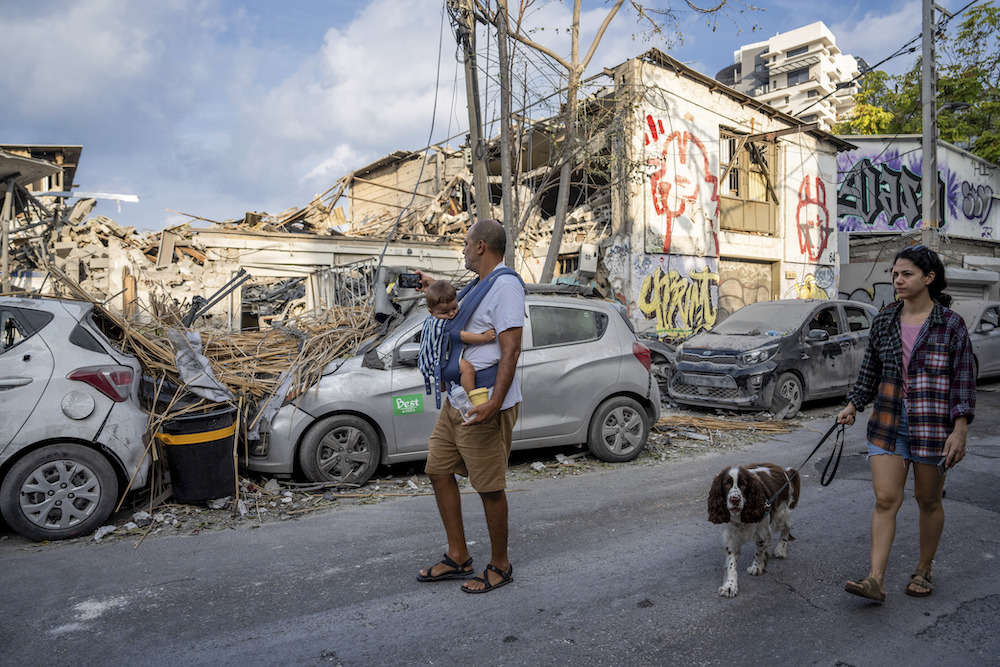
Israelis inspect a destroyed building a day after it was hit by a rocket fired from the Gaza Strip in Tel Aviv, Israel on Oct. 8, 2023. (AP)
Previous conflicts between Israel and Gaza’s Hamas rulers brought widespread death and destruction in Gaza and days of rocket fire on Israeli towns. The situation is potentially more volatile now, with Israel’s far-right government stung by the security breach and with Palestinians in despair over a never-ending occupation in the West Bank and suffocating blockade of Gaza.
On Sunday, militants fired more rockets from Gaza, hitting a hospital in the Israeli coastal town of Ashkelon, said senior hospital official Tal Bergman. Video provided by Barzilai Medical Center showed a large hole punched into a wall and chunks of debris scattered on the ground of what appeared to be an empty room and a hallway. The military said patients had been evacuated from Barzilai before the strike.
School was canceled across Israel.
Around 3 a.m., a loudspeaker atop a mosque in Gaza City blared a stark warning to residents of nearby apartment buildings: Evacuate immediately. Just minutes later, an Israeli airstrike reduced one nearby five-storey building to ashes.
After one Israeli strike, a Hamas rocket barrage hit four cities, including Tel Aviv and a nearby suburb. Throughout the day, Hamas fired more than 3,500 rockets, the Israeli military said.
The shadowy leader of Hamas’ military wing, Mohammed Deif, said the assault was in response to the 16-year blockade of Gaza, and a series of recent incidents that have brought Israeli-Palestinian tensions to a fever pitch.
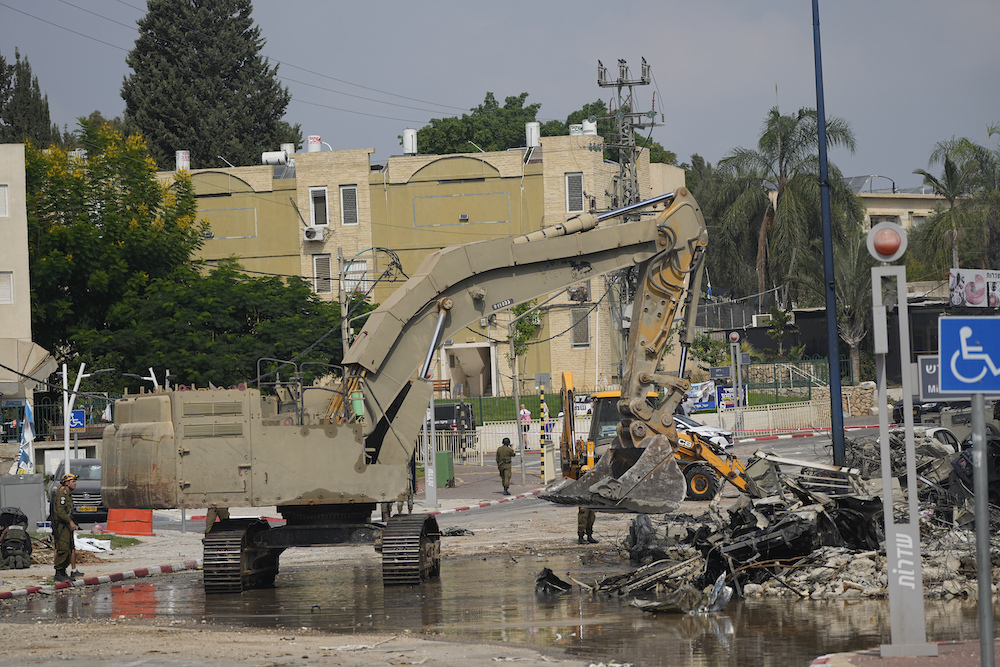
A digger removes rubble from the police station that was overrun by Hamas militants in Sderot, Israel. (AP)
Over the past year, Israel’s far-right government has ramped up settlement construction in the occupied West Bank, Israeli settler violence has displaced hundreds of Palestinians there, and tensions have flared around the Al-Aqsa mosque, a flashpoint Jerusalem holy site.
“Enough is enough,” Deif, who does not appear in public, said in the recorded message. He said the attack was only the start of what he called “Operation Al-Aqsa Storm” and called on Palestinians from east Jerusalem to northern Israel to join the fight.
The Hamas incursion on Simchat Torah, a normally joyous day when Jews complete the annual cycle of reading the Torah scroll, revived painful memories of the 1973 Mideast war practically 50 years to the day, in which Egypt and Syria launched a surprise attack on Yom Kippur, the holiest day of the Jewish calendar, aiming to take back Israeli-occupied territories.
Comparisons to one of the most traumatic moments in Israeli history sharpened criticism of Netanyahu and his far-right allies, who had campaigned on more aggressive action against threats from Gaza. Political commentators lambasted the government and military over its failure to anticipate what appeared to be a Hamas attack unseen in its level of planning and coordination.
Asked by reporters how Hamas had managed to catch the army off guard, Lt. Col. Richard Hecht, an Israeli army spokesman, replied, “That’s a good question.”
The abduction of Israeli civilians and soldiers also raised a particularly thorny issue for Israel, which has a history of making heavily lopsided exchanges to bring captive Israelis home. Israel is holding thousands of Palestinians in its prisons. Hecht confirmed that a “substantial” number of Israelis were abducted Saturday.
Associated Press photos showed an elderly Israeli woman being brought into Gaza on a golf cart by Hamas gunmen and another woman squeezed between two fighters on a motorcycle. AP journalists saw four people taken from the kibbutz of Kfar Azza, including two women.
In Gaza, a black jeep pulled to a stop and, when the rear door opened, a young woman stumbled out, bleeding from the head and with her hands tied behind her back. A man waving a gun in the air grabbed her by the hair and pushed her into the vehicle’s back seat.
A major question now was whether Israel will launch a ground assault into Gaza, a move that in the past has brought intensified casualties. Netanyahu vowed that Hamas “will pay an unprecedented price.” But, he warned, “This war will take time. It will be difficult.”
Israel’s military was bringing four divisions of troops as well as tanks to the Gaza border, joining 31 battalions already in the area, a spokesperson said.
Hamas said it had planned for a potentially long fight. “We are prepared for all options, including all-out war,” the deputy head of the Hamas political bureau, Saleh Al-Arouri, told Al-Jazeera TV. “We are ready to do whatever is necessary for the dignity and freedom of our people.”


